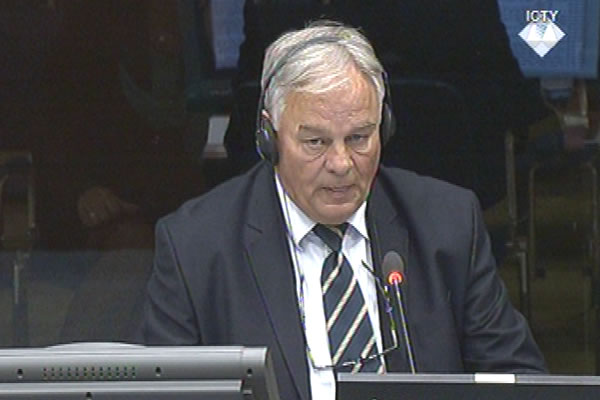Home
'EXTIRPATION' IN PRIJEDOR
In October 1995, one of Drasko Vujic's subordinate officers published an ar-ticle in the Kozarski vijenac, a local newspaper. Commenting on the article, Ratko Mladic's defense witness explained that the threat to 'extirpate Balijas' was aimed only at 'out-of-control Muslim troops', not Muslim women and children
 Drasko Vujic, defence witness at Rako Mladic trial
Drasko Vujic, defence witness at Rako Mladic trial Continuing Drasko Vujic's cross-examination, the prosecutor put it to the witness that knew full well about the expulsions of non-Serbs from Prijedor. Moreover, the prosecutor alleged, the witness supported those activities and participated in them. In 1992, Vujic was appointed commander of a unit of about 1,000 men that was part of the JNA 343rd Brigade. Vujic's unit was later transformed into the VRS 43rd Brigade. Soon after the war broke out, the unit was sent to other battlefields, and returned to Prijedor in 1995.
'Your soldiers openly showed hatred towards Muslims', the prosecutor Amir Zec told the witness, supporting his claim by an article published in the local newspaper, Kozarski vjesnik, in October 1995. The article, entitled We will extirpate them one of Vujic's subordinate officers promises they will make Prijedor 'Serb once again'. 'Balijas will be expelled', the author continues, they will 'disappear' and their 'seed will be extirpated'.
According to Vujic, the text was written at the time when his unit returned to Prijedor to defend it: the town was 'defenseless' and under constant attacks by 'out-of-control Muslim troops aided by NATO'. When the officer said that 'Muslims will be extirpated', he meant only 'those who were attacking them', not the entire Muslim population, Vujic explained. Vujic was perfectly willing to say the same thing today: that the 'enemy' should be 'extirpated'.
Despite the defense's objection, the article from Kozaracki vjesnik was admitted into evidence. The witness asked the judges permission to amend his answer. He explained that the words of his officer referred only to 'those who were attacking them', i.e. armed fighters and definitely not the entire ethnic group, including the women and children. However, presiding judge Orie ruled that the witness's explanation was an unnecessary comment. The words, 'the land will be Serb again', the presiding judge noted, clearly show that the members of other ethnic groups - regardless of their gender and age - were unwanted in that territory.
The witness also denied the existence of any links between the VRS and Zeljko Raznatovic Arkan and his Serb Volunteer Guard. This prompted the prosecutor to show two documents: a RS Interior Ministry order to'Arkan's men' to 'stop abusing deserters and to prepare for combat activities, and an article from the Belgrade weekly Vreme, which quotes UNCHR reports about an action mounted by Arkan's Serb Volunteer Guard in September 1995. Approximately 5,000 Muslims were expelled from Prijedor in the action.
Vujic said he had never seen the article or the MUP document before. The document was signed by the police minister, and it did not concern the army at all. The witness told the judges he had never met Arkan. When he returned to Prijedor in the fall of 1995, the witness recounted, he saw one of Arkan's units in the field but they didn't fight side by side with it. When the witness was re-examined by the defense, he said that he had 'no knowledge as to who brought in Arkan'. Right from the start, Arkan 'was in contact with Simo Drljaca', the chief of the Prijedor police, the witness noted.
The trial continued with the evidence of Nedjeljko Trkulja, a VRS Main Staff officer.
